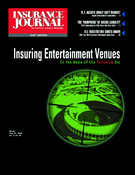The Connecticut Supreme Court has affirmed its view of the so-called Daubert doctrine that expert testimony must be scrutinized closely using a two-pronged test in Linda Maher v. Quest Diagnostics, et al. (SC 17001). The plaintiff brought a medical malpractice action in 1997, alleging that the defendants’ negligence caused a delay in the diagnosis and treatment of her cervical cancer such that her condition deteriorated, her treatment options were altered negatively, and her likelihood of recovery was impacted adversely. The court found that the trial court improperly admitted causation testimony of an expert witness, citing the state court’s own threshold requirements for the admissibility of expert testimony as set forth in State v. Porter in 1997 which in turn followed the U.S. Supreme Court’s findings in Daubert v. Merrell Dow Pharmaceuticals Inc. in 1993. Courts, the ruling emphasized, should exclude scientific evidence from the Porter and Daubert tests only where those scientific principles “are considered so reliable within the relevant medical community that there is little or no real debate as to their validity and it may be presumed as a matter of judicial notice.” The Maher case involved use of the phrase “doubling time” to measure the advancement of the cancer from its inception to surgical state. The court found there was evidence that doubling time, particularly as it relates to cervical cancer, is not an established scientific principle and should not have been admitted without further scrutiny.
Was this article valuable?
Here are more articles you may enjoy.


 Married Insurance Brokers Indicted for Allegedly Running $750K Fraud Scheme
Married Insurance Brokers Indicted for Allegedly Running $750K Fraud Scheme  Uber Jury Awards $8.5 Million Damages in Sexual Assault Case
Uber Jury Awards $8.5 Million Damages in Sexual Assault Case  Allstate CEO Wilson Takes on Affordability Issue During Earnings Call
Allstate CEO Wilson Takes on Affordability Issue During Earnings Call  Allstate Doubles Q4 Net Income While Auto Underwriting Income Triples
Allstate Doubles Q4 Net Income While Auto Underwriting Income Triples 


